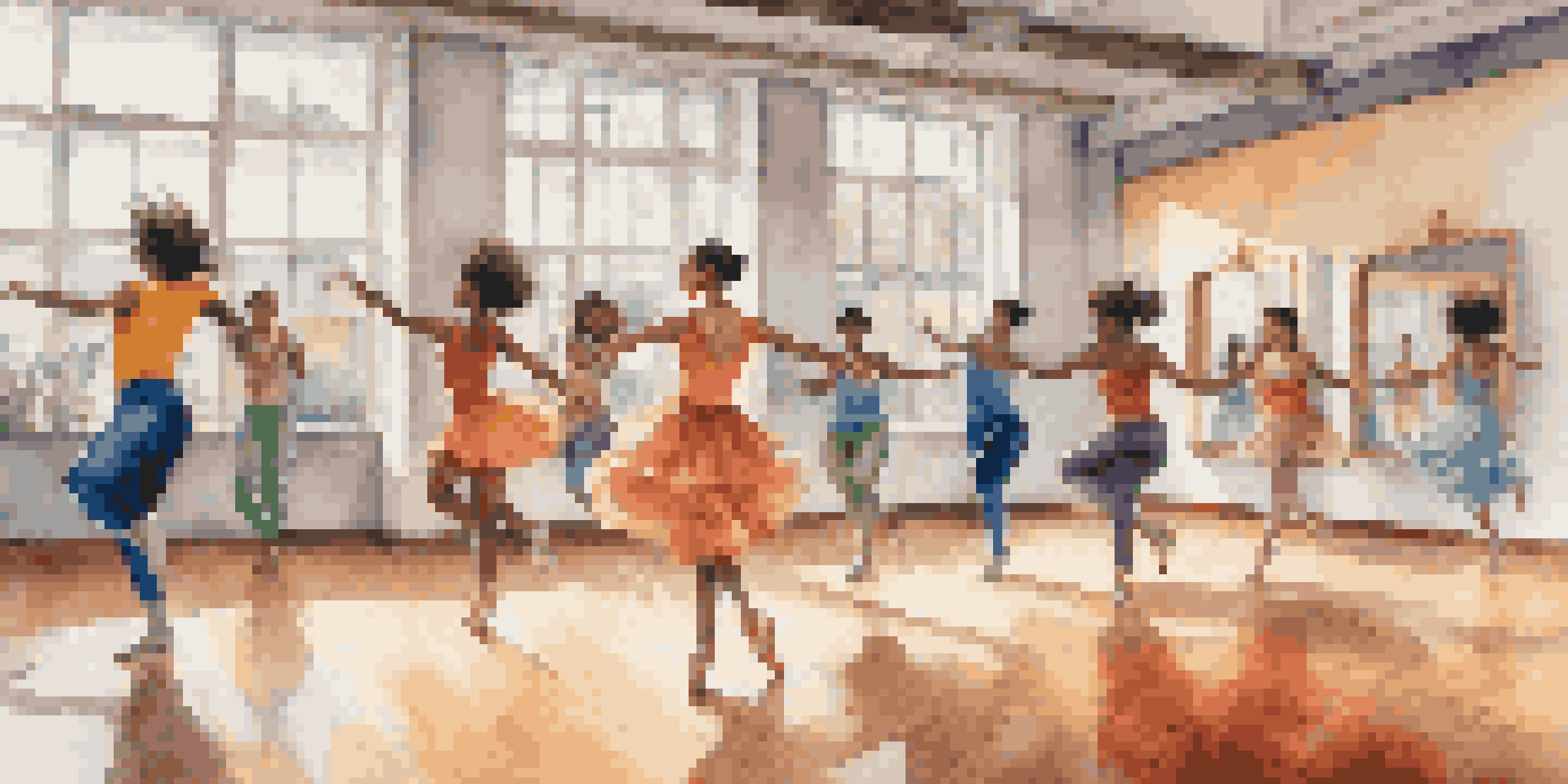Nutritional Supplements: Are They Necessary for Dancers?

Understanding the Demands of Dance
Dancing is a physically demanding art form that requires strength, stamina, and flexibility. Dancers often push their bodies to the limit, and this can lead to fatigue, injury, and nutrient depletion. It's crucial to understand these demands to appreciate why some dancers consider nutritional supplements.
Let food be thy medicine and medicine be thy food.
The rigorous training schedules and performances can leave dancers with increased energy needs. They often burn more calories than the average person, necessitating a balanced diet rich in vitamins and minerals. When nutrition from food alone falls short, some may look to supplements to bridge the gap.
Ultimately, understanding the specific nutritional needs can help dancers make informed choices about their diets and whether supplements are beneficial for their performance and recovery.
The Role of a Balanced Diet
While supplements can play a role in a dancer's nutrition, a balanced diet should always come first. Whole foods provide essential nutrients that supplements can’t replicate, such as fiber and phytonutrients. Fresh fruits, vegetables, whole grains, and lean proteins should form the foundation of a dancer's diet.

For most dancers, focusing on a diet rich in these natural foods can sufficiently meet their nutritional requirements. This approach not only fuels their bodies but also supports overall health and well-being. The right combination of foods can enhance energy levels and improve performance.
Dance Demands Fuel Nutrition Needs
Dancers require a balanced diet rich in nutrients to meet their increased energy needs and prevent nutritional deficiencies.
Incorporating a variety of foods also helps prevent nutritional deficiencies, which are particularly important for dancers who require optimal physical condition.
Common Nutritional Deficiencies in Dancers
Dancers may be at risk for certain nutritional deficiencies due to their high energy expenditures and the demands of their art. For instance, deficiencies in calcium, iron, and vitamin D are common within this group. These nutrients are crucial for bone health and energy production.
The body achieves what the mind believes.
A lack of calcium can lead to weakened bones, increasing the risk of fractures, while insufficient iron can result in fatigue and decreased performance. Vitamin D is essential for calcium absorption and overall immune function, making it particularly important for dancers who train indoors.
Awareness of these potential deficiencies can help dancers take proactive steps, whether through dietary adjustments or targeted supplementation.
Evaluating the Need for Supplements
Determining whether to use nutritional supplements should be a personalized decision based on individual needs. Consulting with a healthcare professional or a registered dietitian can provide valuable guidance tailored to a dancer's specific situation. It's essential to weigh the pros and cons before adding any supplements to a routine.
For some dancers, supplements may be beneficial, particularly if they struggle to meet their nutritional needs through food alone. For example, a dancer with a restricted diet may find that a multivitamin helps fill nutritional gaps. However, others may find that they can achieve their goals without supplements.
Whole Foods Over Supplements First
A well-rounded diet of whole foods should be prioritized before considering nutritional supplements to ensure optimal health and performance.
Ultimately, each dancer's journey is unique, and it's important to listen to one's body and adapt nutrition accordingly.
Types of Supplements Commonly Used
There are several types of nutritional supplements that dancers often consider, including protein powders, vitamins, and minerals. Protein supplements can be beneficial for muscle recovery and growth, especially after intense training sessions. However, it’s crucial to choose high-quality protein sources to avoid additives.
Vitamins and minerals, such as vitamin C, vitamin D, and magnesium, are also popular among dancers looking to support their overall health. These can help strengthen the immune system and support muscle function. However, one should remember that these should complement, not replace, a well-rounded diet.
It's also essential to be cautious about the source of supplements since not all products are created equal. Researching brands and understanding ingredient lists can help ensure safety and efficacy.
Listening to Your Body
One of the most critical aspects of a dancer's health is developing a strong connection with their body. This means paying attention to how diet and nutrition affect performance. If a dancer feels fatigued or notices a decline in performance, it may be a sign to reassess their nutritional intake.
Listening to the body also involves recognizing when it's time to seek professional advice. A healthcare provider can help identify specific nutrient deficiencies and recommend appropriate supplements if necessary. Being proactive about nutrition can lead to better performance and overall well-being.
Personalize Supplement Decisions
Consulting with healthcare professionals helps dancers make informed choices about whether to incorporate supplements into their nutrition plan.
Ultimately, fostering this body awareness can empower dancers to make informed choices about their health, including whether to incorporate supplements.
In Conclusion: Supplements as a Support Tool
Nutritional supplements can be a valuable tool for dancers, but they should not be viewed as a necessity for everyone. A well-balanced diet rich in whole foods should always be the first line of defense in meeting nutritional needs. Supplements may help those who face specific deficiencies or have heightened nutritional demands.
It's essential for dancers to evaluate their individual needs and consult with professionals when considering supplements. Education about nutrition can empower dancers to make informed choices that support their health and performance.

In the end, finding the right balance between diet and supplementation can lead to optimal performance and a sustainable dance career.